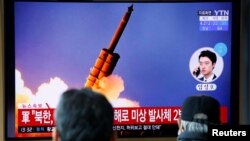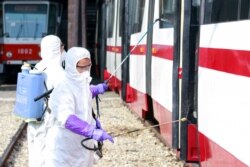North Korea launched two short-range projectiles Monday, South Korea’s military said -- a move that comes as the North scrambles to prevent a potentially disastrous coronavirus outbreak within its borders.
The two weapons were fired from the Wonsan area toward the sea off North Korea’s east coast, according to South Korea’s Joint Chiefs of Staff. The projectiles traveled approximately 240 kilometers at a maximum height of 35 kilometers, it added.
North Korea has not commented on the launch. But officials in Seoul say the test was likely part of North Korean military drills that started last week. South Korea’s National Security Council expressed “strong concern” about the moves, which it said do not help military tensions.
A U.S. State Department spokesman said “We are aware of reports of projectiles launched from North Korea, and continue to monitor the situation.”
North Korea last year launched 13 rounds of short- or medium-range missiles or rockets, amid stalled nuclear talks with the United States. But this is North Korea’s first detected launch since the beginning of the year.
In recent weeks, North Korea has focused on emergency coronavirus prevention efforts, which authorities have called a matter of “national survival.”
Though North Korea continues to insist it has found no coronavirus cases, authorities have shut down foreign tourism, quarantined all arriving foreigners, and even prevented foreign diplomats from leaving their compounds. State media say nearly 7,000 people are being medically monitored.
Some experts said the coronavirus concerns could help reduce military tensions, especially after the United States and South Korea last week indefinitely postponed joint military drills that North Korea sees as a provocation.
But the latest launch suggests North Korean leader Kim Jong Un sees little benefit in restarting diplomacy and instead intends to raise the stakes ahead of important elections in both the United States and South Korea, says Leif-Eric Easley, a professor at Ewha University in Seoul.“
North Korea is making clear with these missile tests it will continue to improve military capabilities and make outsized demands, despite the political and public health preoccupations of Beijing, Seoul and Washington,” Easley said.
Kim has kept a low-profile during the coronavirus scare. But on Friday he led a military exercise alongside other top military officials -- all of whom, unlike Kim, wore face masks. It is not clear what weapons North Korea used in the drill, but state media said a “target islet” was reduced to “a sea of flames.”
Bigger tests could be coming. In a New Year’s speech, Kim said he no longer felt bound by his self-imposed suspension on long-range missile and nuclear tests. He also warned the world would soon witness a “new strategic weapon.”
The weapons tests appear designed in part to increase North Korean leverage in nuclear talks and to help build deterrence against U.S. military power.
But the launches also could serve as an attempt to shore up domestic political strength, stressed Park Won-gon, professor of international politics at Handong Global University. “
The purpose of the test has more to do with the outbreak of the coronavirus in North Korea and less to do with it being a provocation,” Park said. He says North Korea may be “showing off deterrence to its people” as a precursor to accepting international emergency aid. “
With the spread of the virus, North Korea has to strengthen its solidarity and convince its people,” he said. “It is very typical North Korean behavior -- to provoke and raise tensions just before accepting external aid.”
There have been recent signs of domestic political friction in North Korea. On Saturday, the official Korean Central News Agency reported that Kim dismissed a pair of senior political leaders following what officials characterized as a corruption scandal.
KCNA did not describe the scandal in detail, but spoke of “unpopular and anti-socialist acts.” The article seemed to link the alleged corruption to coronavirus prevention efforts, saying "no special cases must be allowed within the state anti-epidemic system.”
Experts have warned that North Korea, parts of which are impoverished, does not have adequate medical supplies to deal with a serious disease outbreak.
Several international aid groups are preparing to deliver emergency medical supplies to North Korea. Some have had to apply for special exemptions, since interaction with North Korea is tightly restricted due to international sanctions.





